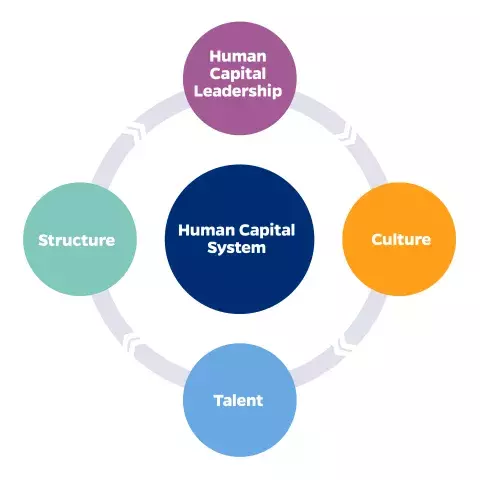Search
Do you trust the American health care system? Can policymakers help you trust it more?
Clone of HCDL combined (insights and research)
Projects and Resources

At-A-Glance
Program Details
Human Capital Development Lab
The Human Capital Development Lab seeks to address the current challenges that affect the sustainable development of human capital around the world. In each of our focus areas within the human capital system, we work to build a common understanding of key issues and leverage our affiliated faculty from across Johns Hopkins University and beyond to help provide research using evidence-based approaches.
Focus areas
Talent
Considering future demands and the current challenges such as
» Ongoing learning and skill development
» Developing health and well-being solutions

Structure
Evaluating mechanisms to optimize effectiveness and efficiency considering
» AI-human teaming
» Future-of-work modalities
Culture
Analyzing how to shape and align culture with strategy in light of
» Creating a great workplace environment
» Fostering diversity and inclusion
Human capital leadership
Assessing the CHRO agenda as an element of top leadership considering
» Navigating the ESG impact
» Aligning human capital for strategy execution
For ongoing updates from the HCD Lab, please be sure to join our distribution network or become a partner.
Based on current trends and input from human capital leaders, we have a number of project efforts underway. Please reach out to us if you would like more information or if you have questions about these and other areas affecting human capital development.
-
With rapid changes in the technology used for managing human capital as well as the solutions employed to develop human capital, the digital and AI area is a key priority. While ChatGPT has caught the attention of the world and individuals are learning the tool and its capability, it will take some time for regulation and firm policy to catch up to the current state of practice. The role of the CHRO is to not only embrace this new movement, but also work with business leaders to determine the parameters and guidelines for early adoption inside the firm as well as in the industry. At the same time, HR tech is changing rapidly, and CHROs must be in the driver's seat for the new technologies shaping the future of the HR function.
-
Not only have the costs associated with health care for employees risen dramatically, but employers now also understand the impact of mental health in the workplace and beyond. Beyond wellness programs, more organizations are making employee health a proactive platform, and some leading firms are addressing employee health care costs head-on, finding ways to integrate health, wellness, and cost-effectiveness for their organizations and their people.
-
While it seems that building a great workplace culture with high levels of engagement is a flashback, current evidence suggests that most firms need to get back to basics. The pandemic changed expectations in many firms and the norms around the world. Suddenly we have navigated from the work-from-home requirement to pushing the work-from- the-office desire, while also addressing "quiet quitting” and the challenge of employee preferences for remote work. We cannot hope to transform organizations if we don’t get the basics right. Creating a great workplace with high engagement and a trusting culture is the No. 1 agenda item going forward.
-
At a macro level, we have witnessed several setbacks in education as the global pandemic limited the advancement of learning in many locations, especially in those locations without access to adequate technology. As a result, we have significant challenges ahead at a national level in many countries. At the same time, the challenge of developing new skills in workforces and building a digitally savvy employee base is a top priority for many firms. Yet, we are also reminded of the need to develop broad-based critical and creative capabilities that drive human contribution in the age of AI.
-
The issues associated with diversity, human rights, privacy and data security, labor rights, and a firm's sustainable global human capital footprint are key agenda items for the CHRO. These global issues may surface at a national level, but can quickly become a part of the global agenda. For example, the firm stance on LBGTQ individuals in locations such as Malaysia and the Philippines may create extra challenges in navigating global policies with local values and regulation. Investors and analysts increasingly scrutinize corporate governance in terms of board composition, top management team composition, and overall representation. Executive compensation, board roles, proper committee structures, and other governance mechanisms typically fall to the CEO and CHRO for compliance as well as buy-in. While this may be relatively straightforward in the United States, the proper governance for joint ventures, new ventures, global expansion, and new developing markets are worthy of additional CHRO focus.
Nexus Awards empower Carey faculty to explore gender equity, generative AI, health care policy, and other societal challenges
Partnering With Teaching & Learning
Partnering With Teaching & Learning

Teaching & Learning
Teaching & Learning
Teaching & Learning is supported by several teams to improve student achievement and experience in onsite and online courses.
Unless noted otherwise, please reach out to Carey.Learning@jhu.edu for requests. If you are looking for direct contacts, check out our About Us page.
Areas of Specialization
-
The Instructional Design & Technology team works with faculty to develop and redesign course materials. IDT supports the creation of new courses, accreditation materials, and course accessibility.
Roles: instructional designer, senior instructional designer, instructional design manager
-
The Media team is an expansive group responsible for the development of multimedia for Carey courses, including videos, interactives, animations, and graphics. For Media assistance, contact Collin Diesenberg (cdiesen1@jhu.edu).
Roles: multimedia producer, editor, eLearning artist, animator, graphic designer, multimedia supervisor
-
The Carey Learning Technology Group provides online course maintenance and Canvas learning management system support during the semester. Any issues students might encounter within a course can be forwarded to the team.
For questions, contact Carey_LT@jhu.edu.
Roles: learning technologist, senior learning technologist, learning technology supervisor
-
Learning Innovation & Technology advances educational excellence for Carey students. Together with Carey faculty, LIT designs impactful, inclusive courses
Roles: teaching consultant, senior teaching consultant, instructional design manager
-
Department Function Email Carey IT Hardware issues, password lockouts, onsite course support Carey.HE.ITHelp@jhu.edu or for DC 555_IT-AV@jhu.edu Carey Learning Technology Group (CTG) Live course support, proctoring tools, other learning tools Complete this form Carey LMS Canvas support Carey.Canvas@jhu.edu T&L General and miscellaneous inquiries, classroom questions Carey.Learning@jhu.edu Carey Faculty Bookstore, faculty budget inquiries, course load Carey.Faculty@jhu.edu Carey TA Hiring teaching assistants, training teaching assistants, other TA inquiries Carey.TA@jhu.edu Course Evaluations Request course evaluations prior to official release date Carey.Course.Evaluation@jhu.edu Media Team Additional media inquiries outside of normal revisions and revamps Carey.Learning@jhu.edu eReserves Request eReserves for courses Reserves@jhu.edu Office of the Registrar Inquiries regarding course numbers, classroom placement, waitlists Carey.Registrar@jhu.edu
Policies, Procedures, and Expectations
-
Acronyms and commonly used terms quick guide:
Term Meaning Sync Session Synchronous Online Sessions: Organized opportunities for faculty and students to meet over Zoom. Revamp/Revision Two distinct levels of updates to online stage courses:
- Revision: Regular updates made to a course prior to the go-live (e.g., points totals, assessment questions, minor content updates).
- Revamp: Scheduled (2–5 years) updates made to a course that ensure that the content is current for an extended period (e.g., updated content videos, improved interactives, overhaul of the course).
Stage Course Formerly known as “Course Template.” The location where an online course was originally built and is maintained, to be cloned out to live sections of a course by the Carey Learning Technology Group. Hotfix A needed fix to a learning asset that is broken or not working properly in a course that is currently live or going live soon. Assurance of Learning AoL: The systematic process and assessment plans that collectively demonstrate that learners achieve competencies for their program in service of the school’s accreditation. Zoom Classroom Support ZCS: Undergraduates who will work to help faculty with basic Zoom tasks during online class sessions.
-
- Learning objectives are the most important part of course development. Without them, we would not have a clear understanding of what students are supposed to gain from an activity.
- The best crafted objectives are written in a way that establishes what is known as the “ABCD Model”:
Audience Who will be completing the activity? Typically, this is students in your course. You will want to consider this group in terms of existing funds of knowledge. Behavior What concrete action will this audience be able to perform at the end of the lesson? This is often the behavior/action you will grade on. Students commonly recite, identify, or present. More of these and their greater category can be found in Bloom’s Taxonomy diagrams.
Hint: “Understand” and “Know” are not measurable.Condition Under what circumstances will this audience perform the behavior? This could be time or other restrictions/rules, or after different experiences/stimuli. Degree To what degree will this audience do this, or what is the mastery level? We often think that 100% is the goal, but often times this is not realistic for your audience. Use this variable to determine what the audience experiencing success looks like.
-
- The course blueprint is a tool used by Teaching & Learning to document the components of a course before building it in the LMS.
- In collaboration with the faculty designer, the instructional designer and multimedia producer, in addition to other T&L staff (also known as the course design team), uses the blueprint document to align objectives, draft an outline of the course, and identify any technologies or tools needed for the course to be successful.
-
(See Course Evaluations & Surveys for more information)
- Mid-course evaluations
- Mid-course evaluations are surveys administered to students in certain courses during week 3 of the term. Reasons for distributing a mid-course evaluation to students include (but are not limited to) the following:
- The instructor is teaching an online course for the first time.
- The instructor is teaching a newly developed or redeveloped online course.
- The instructor would like to opt in to evaluation.
- This feedback is shared with the Faculty Leadership team and the course instructor.
- Mid-course evaluations are surveys administered to students in certain courses during week 3 of the term. Reasons for distributing a mid-course evaluation to students include (but are not limited to) the following:
- End-of-course evaluations
- End-of-course evaluations are surveys administered to all students during week 7 of the term. The data collected in the answers to these questions are shared with the course instructor and might be used in the promotion and tenure process.
- End-of-course evaluations are given to all instructors. Please reach out to Carey Course Evaluations (Carey.Course.Evaluation@jhu.edu) with any queries about additional survey questions.
- How to request assistance
- Instructors may request mid-course evaluations by reaching out to Carey Course Evaluations (Carey.Course.Evaluation@jhu.edu). Instructors may also ask about adding extra questions to a mid-course or end-of-course evaluation survey.
- Alternatively, instructors can create a survey in Canvas or their preferred anonymous survey tool (e.g., Qualtrics, Google Forms, SurveyMonkey) to ask more specific questions about their course and course material.
- For more information, please consult Course Evaluations & Surveys.
- How to view results
- Instructors can view their results by selecting the Instructor Course Evaluations tab in the course navigation menu on the Canvas course page.
- Who can see results?
- Only the instructor, faculty leadership, and those acting on their behalf may see evaluation results.
- Instructors might need to collect and share results for promotions, tenure, or other purposes.
- How to share results
- Please reach out to Carey Course Evaluations Carey.Course.Evaluation@jhu.edu) for specific instructions on sharing results.
- Mid-course evaluations
-
IN-PERSON&
HYBRID*
SYNCHRONOUS ONLINE
ASYNCHRONOUS ONLINE
- Students and faculty meet in real time (synchronously) in a classroom
- Weekly class sessions in the classroom
- Students and faculty meet in real time (synchronously) with some students in the classroom and some students joining remotely via Zoom
- Weekly class sessions that take place both in-person and via Zoom
- Students and faculty meet in real time (synchronously) via Zoom
- Weekly class sessions via Zoom mimic in-person classes
- Student learning happens primarily independently (asynchronously)
- Synchronous sessions are optional for students (although strongly recommended) and typically occur only during select weeks
Note: Hybrid is no longer a modality that is regularly scheduled at the Carey Business School. Any hybrid flexibility regarding in-person classes is at the instructor’s discretion.
-
eReserves are digitized course materials accessible online, providing convenient remote access to readings and resources for students and faculty.
- Requesting eReserves - New Requests or Courses:
- Forward your syllabus or reading list, with full citations and assignment due dates, directly to Reserves@jhu.edu by the deadline. Processing could take 2–4 weeks or longer if purchases for the collection apply.
- Copy the business librarians’ service address at businesslib@lists.jh.edu.
- In the subject line, type the course number, section and term.
- If students must complete a reading or viewing before the first class, indicate it in the subject line and message. Flag as high priority.
- Reposts of Previously Used Content for Existing Courses:
- In the subject line of your email to Reserves@jhu.edu, type REPOST and the previous course number, section, and term.
- If students must complete a reading or viewing before the first class, indicate it in the subject line and message. Flag as high priority.
-
Many of these responsibilities fall under the course instructor, but Teaching & Learning (T&L) is here to help. If you have questions about these responsibilities, or how to enact them, please contact carey.learning@jhu.edu.
Responsibilities Onsite/Remote Live
Online
Faculty
T&
Faculty
T&L
Notes
- Publishing courses
X
X
- Publish after receiving cloning confirmation from Carey LT
- Identifying course changes/updates prior to semester start
X
X
- Faculty reach out to T&L to request updates
- Updating course issues/making requested updates during the course
X
X
- Faculty can request updates/fixes that they are unable to address during the course, and T&L will attempt to make updates as possible
- Requesting Canvas course support
X
X
- Faculty reach out to T&L to request updates
- T&L staff will troubleshoot
- Hiring/adding TAs, ZCS
X
X
- Faculty can request assistance with hiring/training TAs or ZCS by contacting Carey.TA@jhu.edu
- Grading/submitting grades to SIS
X
X
- Instructors can ask T&L for help using grading tools
- Faculty should reach out to the Office of the Registrar for assistance uploading grades to SIS
- Adding accommodations to Canvas course
X
X
- Faculty can employ these, but may notify Carey.Canvas@jh.edu of accommodations and request that they employ these in Canvas
- Copying course materials from one section (or stage course) to the live section(s)
X
X
- Online instructors are required to inform the Instructional Design & Technology (IDT) team which source course to use.
- IDT will inform the online faculty when the course has been successfully cloned
- Updating and uploading syllabus to Canvas course
X
X
- Request template at Carey.Faculty@jhu.edu or the last-run version of the syllabus from a former faculty member
- Facilitating synchronous online sessions
NA
NA
X
- Faculty are asked to contact Carey.Registrar@jhu.edu to submit sync session times
- Reach out to T&L for ZCS support
- Ensuring accessibility of documents in course
X
X
X
- Most documents should be accessible in existing/new online courses, but faculty should reach out to T&L to request updates to make documents more accessible T&L staff will update course documents
- Handling set up for proctoring/BYOD exams
BYOD setup (Respondus LockDown Browser)
Remote Proctor Now setup
- Faculty may request assistance from T&L in setting up Respondus LockDown Browser administered exams, but must do so within the requested timeline
- Proctoring tool report
X
X
- Faculty or their TAs must proctor exams or review the proctoring tool reports
- T&L can assist with next steps if issues arise
- Handling LTI setup for McGraw-Hill Connect or other applications
X
X
- Faculty must request LTI setup by emailing Carey_LT@jh.edu
- Requesting eReserves
X
X
- Faculty must send their eReserves list or syllabus to Reserves@jhu.edu
- Requesting updates to videos, interactives, or bios
X
X
X
- Faculty can request updates to videos and other course media, which will be updated by T&L
- Referring students who have technical issues to CATS
X
X
- Faculty should refer students who have technical issues to tech support—they may escalate to T&L if they cannot address the issue
- Updating synchronous online session link
NA
NA
X
- T&L can assist if faculty send a request
- Training for Kaltura/ My Media and other course tools
X
X
X
- Faculty will be onboarded with information about tools that are used in their courses and ways to get assistance/further training
- Creating an interactive faculty bio
NA
NA
X
X
- Faculty will be referred to the T&L Media team during online course onboarding. They will schedule and work with the faculty to create an interactive bio.
- If a faculty member is teaching a new online course, they should request that their bio be added to their section.
-
Referral links to specific pages as needed (Inside Carey)
- FERPA
- New Employee Orientation
- You have to be a current JHU employee to access this training.
- Mental Health/Mandated Reporter Guidance
- Requesting materials
- Send textbook requests to Carey.Faculty@jhu.edu.
- Harvard Course Packs
- Updating Faculty Bio
- Interactive bio in Canvas: Contact Collin Diesenberg (cdiesen1@jhu.edu).
- Bio on the Carey website: Contact Carey.Faculty@jhu.edu to request alterations.
- Getting classroom support
- Support in Harbor East classroom
- Carey IT (Carey.HE.ITHelp@jh.edu)
Support in DC classrooms
555 IT (555_IT-AV@jh.edu)